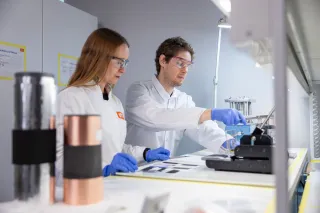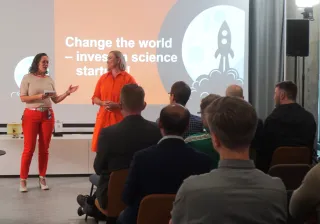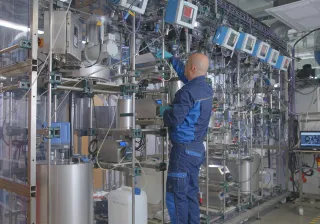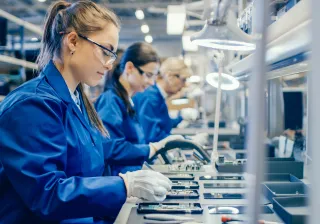VTT Technical Research Centre of Finland is leading the development of more efficient and sustainable recovery of lithium. The joint effort of industry and researchers supports the EU's goals of increasing the self-sufficiency rate of important metals and creating a new sustainable extractive sector in Finland.
Global electrification is thirsty for critical metals, of which lithium plays a big role. All lithium chemicals used in electric car batteries and mobile phones are mined and processed outside Europe. At the beginning of 2023, the European Commission took a significant step towards self-sufficiency by publishing the Critical Raw Materials Act (CRMA). The regulation defines clear goals for developing the value chain of strategic raw materials and focuses, among other things, on lithium processing.
At the beginning of this year, the EU-funded, international LITHOS project, for which VTT has the leading responsibility, started to develop more efficient lithium recovery. The project aims to enable existing processes to utilise larger shares of lithium resources and brings innovations to processing lithium mineral impurities.
The long-term goal is to support Europe’s ambitions to improve its self-sufficiency of lithium supply by increasing the recovery rate of mining and refining operations.
"Lithium recovery is a significant issue because lithium mining is very small in Europe: in practice, we are completely dependent on lithium imported from elsewhere. By developing even more efficient lithium recovery and technology, we can get more out of the scarce reserves and even contribute to the birth of a completely new industry in Europe," describes research professor Päivi Kinnunen from VTT.
The circular economy is one enabler of more sustainable mining operations. For example, by closing water cycles, the environmental footprint is reduced. The goal is to develop a concept that allows for 90 percent lower water consumption and a significant reduction in carbon dioxide emissions compared to current operations in Asia, thus making the processes that apply LITHOS significantly more environmentally friendly than current methods.
Cooperation with industry throughout Finland and Europe
The project involves close development cooperation with projects in France and Portugal, for example. The partner in Finland is Sibanye-Stillwater's Keliber lithium project, located in Central Ostrobothnia. It aims to be the first European company to produce battery-grade lithium hydroxide based on ore from its nearby mines. Keliber lithium project’s operations cover the entire value chain, from mining spodumene to refining the ore into lithium hydroxide.
"Participation in the LITHOS project supports the goal of Sibanye-Stillwater's Keliber lithium project to develop sustainable production of lithium. It aims to increase the efficiency of lithium recovery, which is one of the research areas of the project. If it becomes viable to use spodumene with a lower cut-off grade for lithium, it increases the mineral reserves. Working with a consortium enables VTT to have a multi-faceted approach," says Hannu Hautala, Senior Vice President of Sibanye-Stillwater’s Keliber operation.
"Metso's product range covers battery grade lithium chemical manufacturing technologies from salt brines, but also from lithium containing ores such as spodumene. Metso has developed and patented an acid and sulfate free process for lithium recovery. It is one of the most environmentally responsible lithium production processes based on Metso’s strong expertise in minerals’ beneficiation processes and hydrometallurgy. This is a result of long-term research and development work and close collaboration with our mining customers around the world," says Don Simola, Director of Metso's battery chemicals business.
"We are also investigating the processing of lithium-containing ore minerals other than spodumene. Participation in the LITHOS project supports Metso's research and development projects in this field and enables new openings in the technology development front. It also enables us to improve and expand the partnership network as part of the research consortium," says Simola.
VTT researchers from various fields participate in the process chain of lithium minerals from the initial stages to processing, bringing expertise in water cycle management, spodumene phase transformation, leaching, and process digitalisation.
LITHOS's sister project, the multinational EXCEED project, which started a year earlier, develops cost-effective, sustainable, and responsible processing routes to recover by-product metals and industrial minerals. Together, these projects create the most waste-free and holistic way to retrieve materials.
“We are facing the choice either to continue the de-industrialisation of Europe and import critical raw materials or initiate sustainable European mining and refining with projects like LITHOS, which aims to effective and sustainable material-flow management to ensure competitive processes,” says Päivi Kinnunen.
The development promises significant progress in Europe's efforts to reduce its dependence on imported raw materials, optimize the sustainability of lithium and battery production, and strengthen Europe's and Finland's economic and strategic position on the world market.
More information:
Päivi Kinnunen
Research professor, LITHOS project coordinator
[email protected]
https://exceed-horizon.eu/about/
Media material
VTT hydrometallurgy piloting - VTT Material Bank (contenthub.fi)







